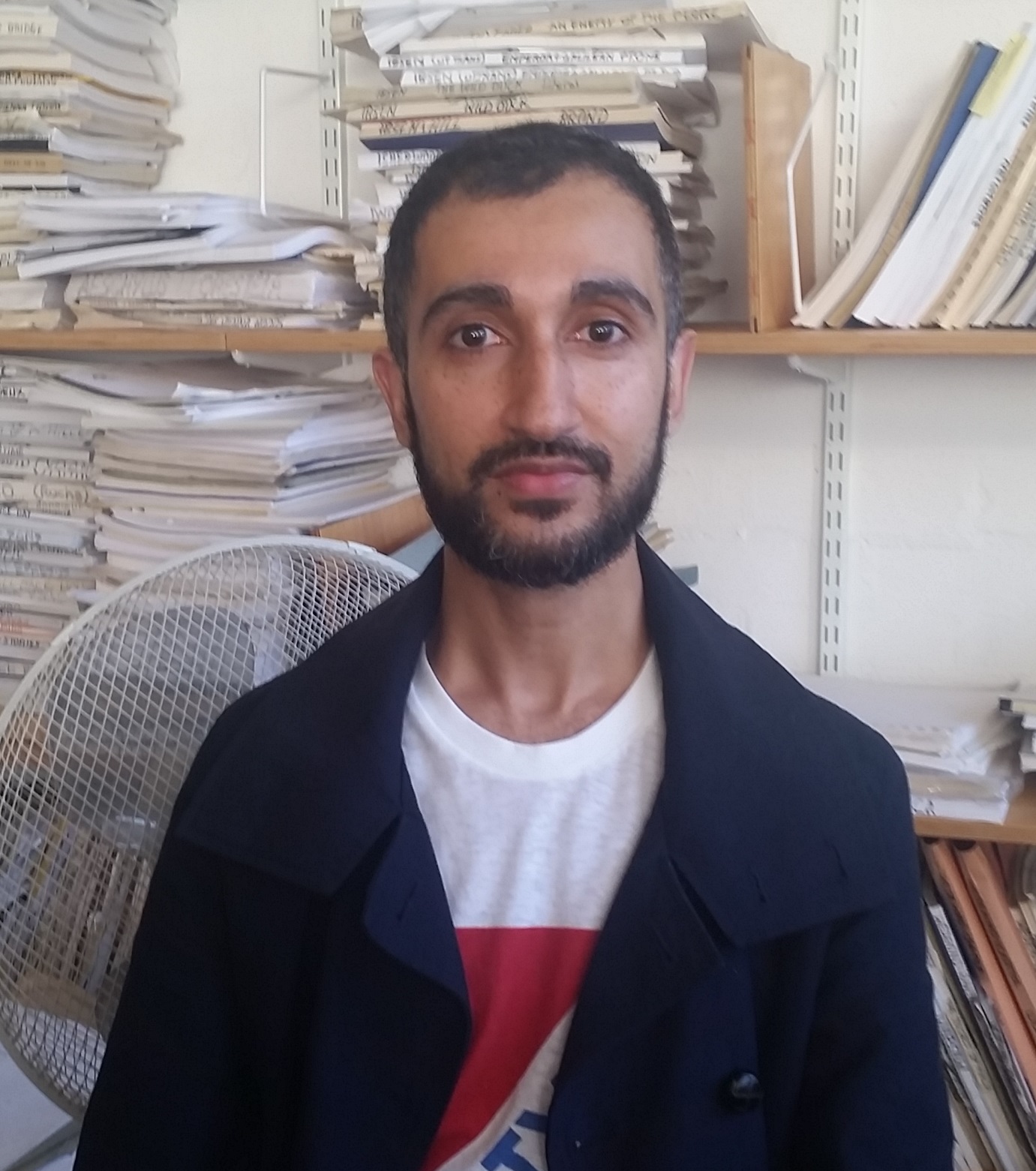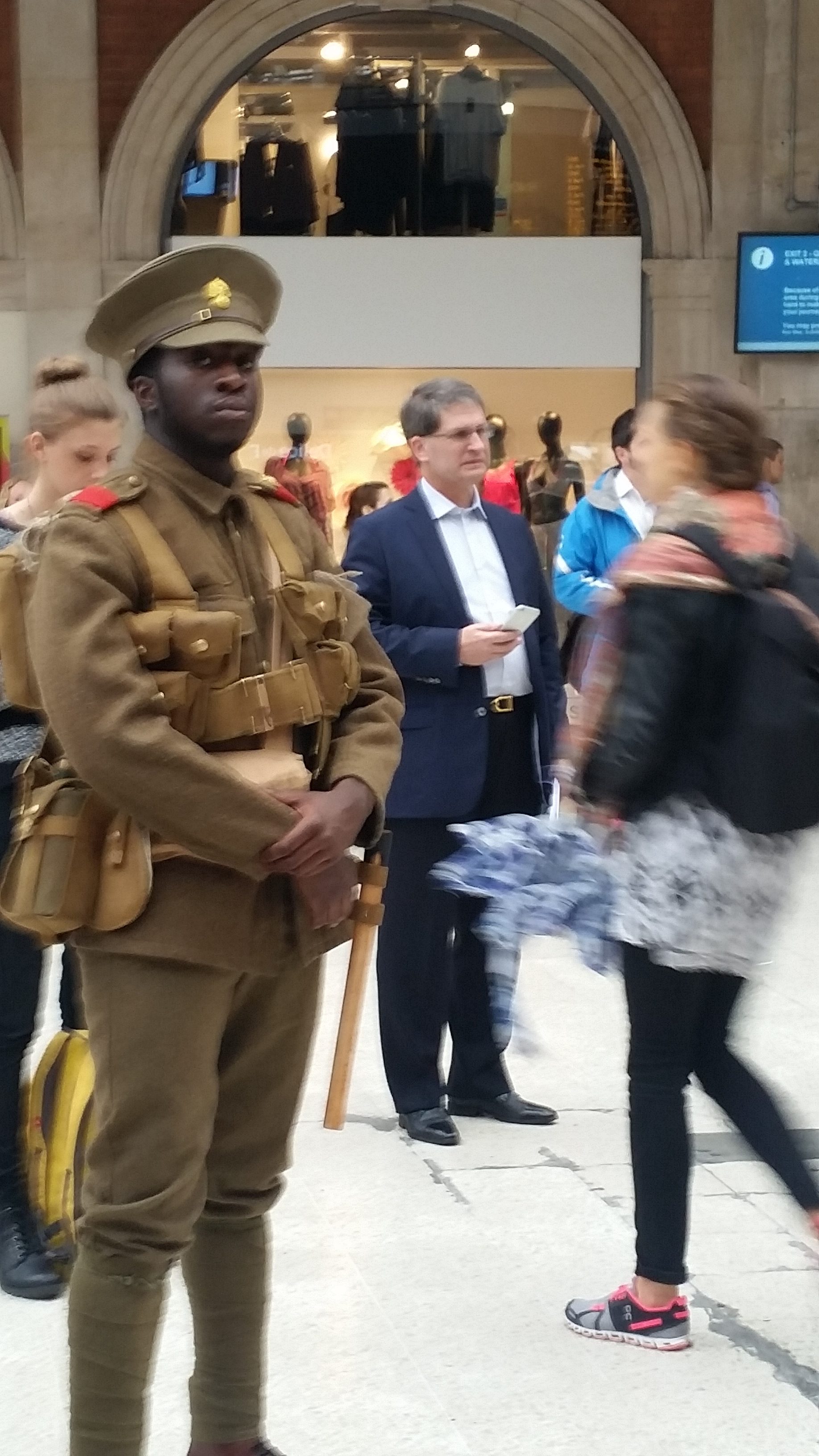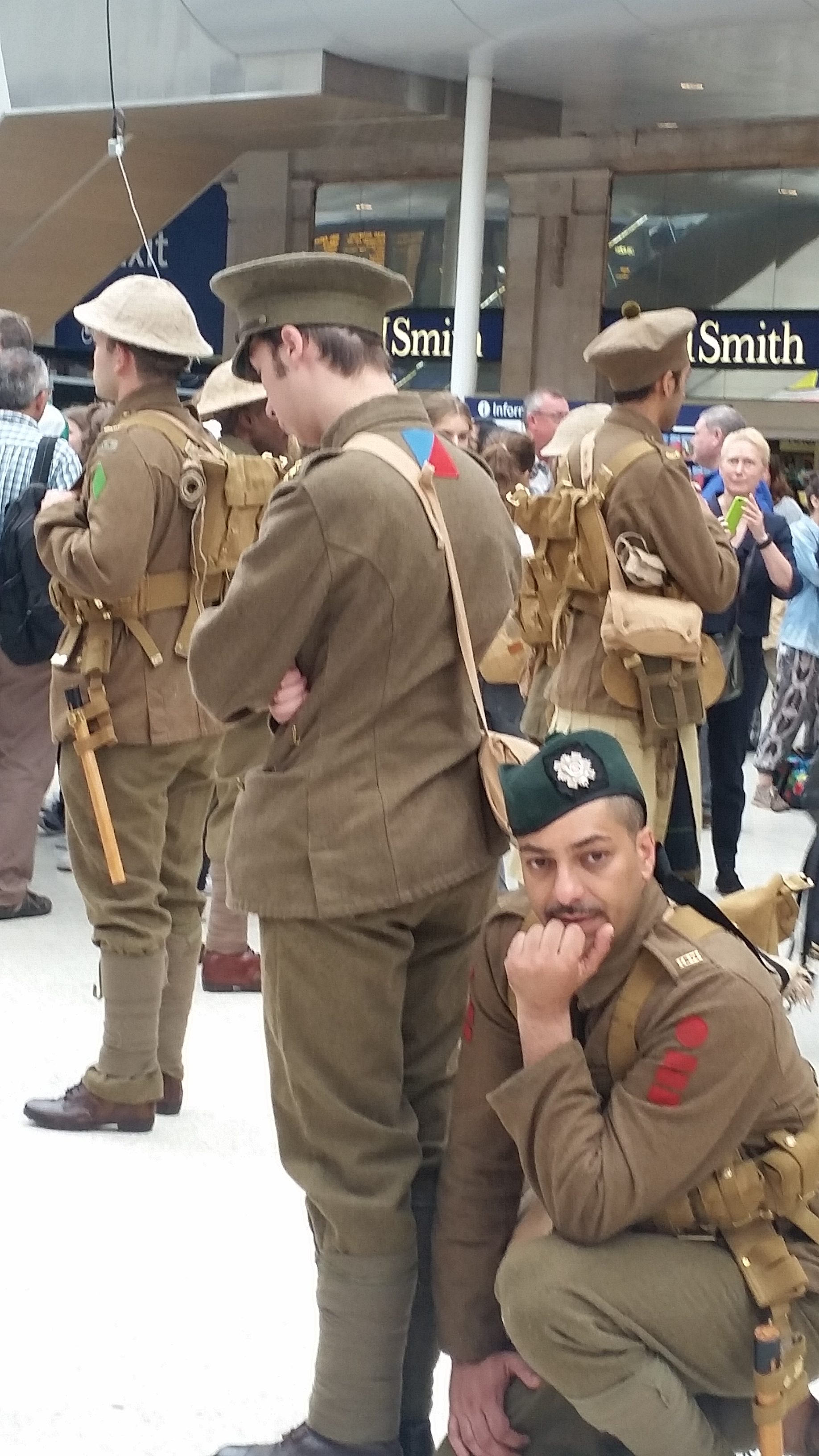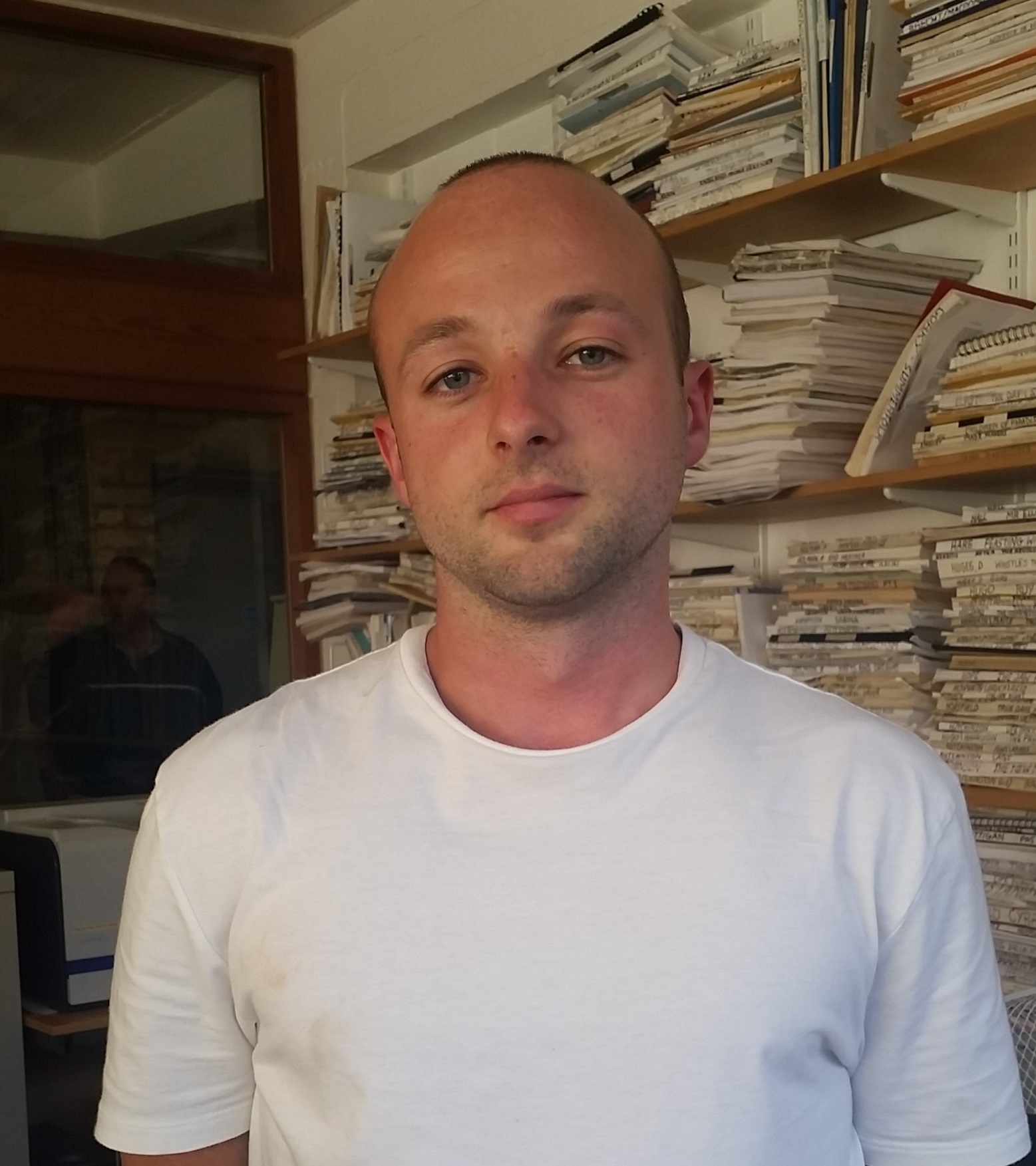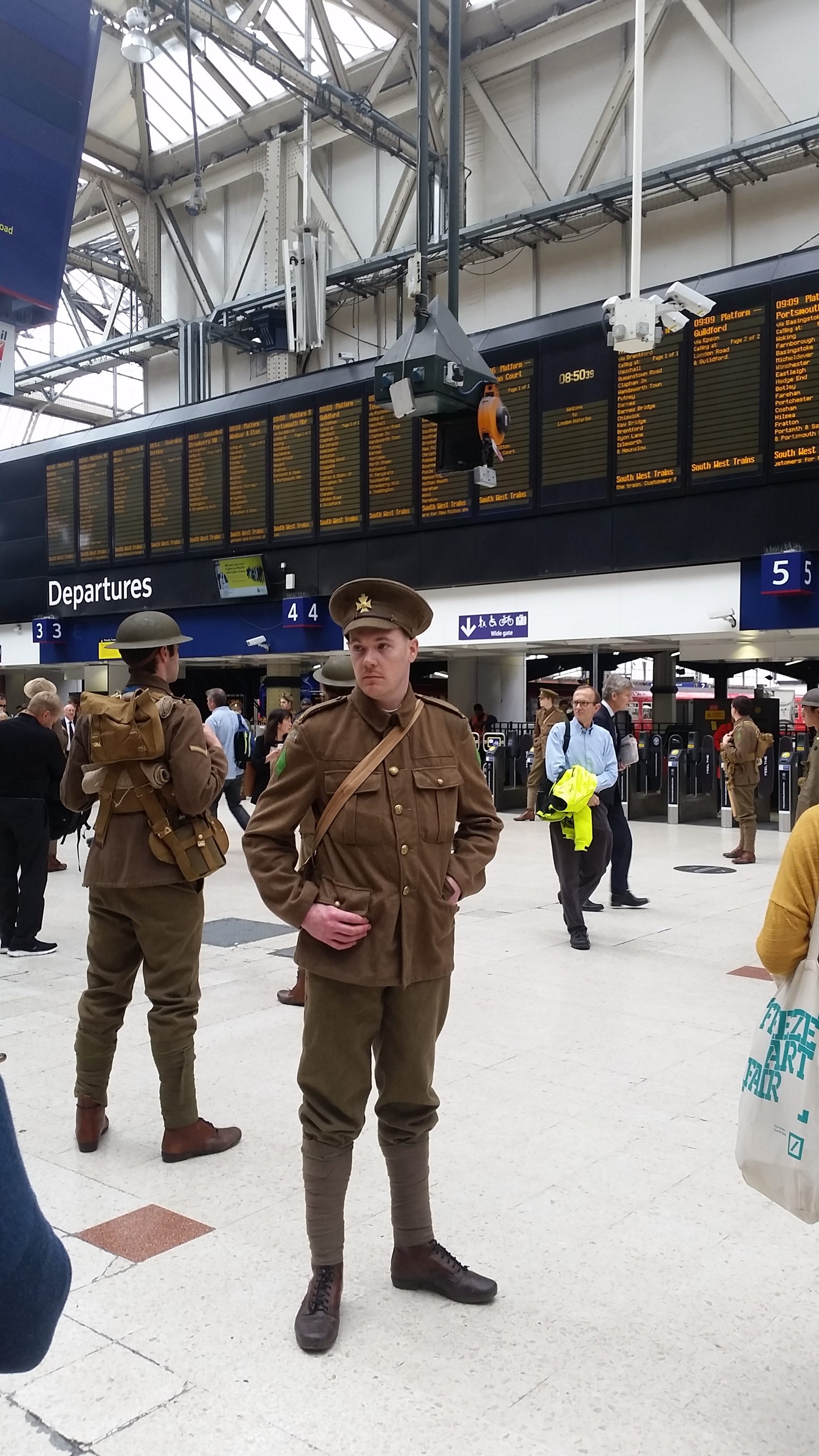‘we’re here because we’re here’: Interview with two performers
Rachel Taggart-Ryan, Communications Assistant at PHF, interviewed participants in the ‘we are here because we are here’ performance, part of the commemorations marking the 100th anniversary of the Battle of the Somme. This performance was commissioned by 14-18-NOW, and conceived and created by Turner Prize-winning artist Jeremy Deller in collaboration with Rufus Norris, Director of the National Theatre. It was produced by Birmingham Repertory Theatre and the National Theatre.
Interview One: Arif
Can you tell me how you first heard about the project and became involved in it?
- So I am a member of the National Theatre, so I go to the National Theatre quite a lot. And I saw a tweet, looking for men aged between 18 and 40 and thought ‘well I fit the bill.’ I love the National. For me, as diverse as the national can be, I find that it is not as diverse as it could be. I thought I want to do something about that, so I’ll step forward and be part of whatever this project is.
So was that one of the main reasons you wanted to take part – the diverse side of it?
- Yeah, diversity was a big thing for me. I wanted to make sure there were people of different backgrounds, different cultures as part of this project. Not knowing what the project was at the beginning. Then when I found out what the project was, there was a part of me that was slightly hesitant. I am very much anti-violence. I am very much a pacifist. But I think back then, in World War One, there was a clearer sense of the good side and the bad side. I think these young men who fought on our behalf, they were doing it knowing they were fighting for good. That kind of assuaged my feelings about it and made me think – you know what they did is what we have now. We have the freedoms and we are able to celebrate the difference between us. And we are able to be whoever we want to be because of those people who fought for us in World War One.
Can you talk me through what the day’s events have been so far?
- So we started off very early this morning, getting into our costumes and then our first stop was Waterloo Station, where we starting interacting with members of the public. It was amazing.. People were really fascinated and interested by these men in soldier’s outfits. And then handing people the cards with the information about the soldiers on them that we were representing. You really felt an emotion. I had to stop myself quite a few times from crying because the emotion was so palpable.
Would you say that was one of the biggest challenges of the day?
- Yes, very much so. It was very much about stopping myself from going with what my feelings were inside. Especially when there were people who teared up themselves. My human instinct is to want to hug that person, to console them. But as a soldier… it was stronger to just be there, be neutral and don’t converse with them.
Did you know much about the particular person you had the card for?
- Not much. I knew his name and I knew the battalion that he was in and the age that he died on the day 100 years ago, at 17.
That makes it almost more poignant becoming almost nameless – nothing but a name?
- It is, but I think the fact that we have his name. I believe in spirits and I think remembering him and remembering these people pays them dues. The fact that 100 years from when he passed people are still thinking about him and talking about him. He didn’t die in vain. We appreciate what he did for use. He gave up his life at the age of 17. He was a young man. When I was 17 I could barely tie my own shoelaces, let alone go fight a war. That really hit home to me when I found out his age. Again it made me very very emotional. I just though at 17, there was so much he didn’t experience. He might not have experienced love. He might not have experience relationships. He might not have lost his virginity. These things that we know. I am 33 now. I feel that I have lived a fair bit of life. I think that when I was 17, I had barely lived any of it.
Was there a sense over the last two months of camaraderie developed between you and the other participants?
- At first I suffer from anxiety and I remember my first rehearsal. I really had to force myself to do it. I walked through the doors and I saw all these people and it was literally fight or flight. I was like no, I put myself up for this, I will do it. Today I was one of the leaders and it was really weird because at one point I was leading and I saw the reflection of the rest of my team in a window and I felt this real pride that these are my boys. It was really strange.
To sum up, what would you take away from this experience?
- I think for me the biggest thing is how something 100 years ago can still hold so much emotion in so many people. Including myself and I didn’t know much about it before I did this project. The fact that especially in our current climate where, the EU referendum and us voting out and people saying that people in World War One and Two fought for us to not be part of Europe, which I completely disagree with. For me, I feel like they fought so that we could be all together. Not an individual island, but to be a big Europe. That it was very much about us – us collectively no matter where you are from, no matter the colour of your skin, your sexuality, your gender identity. We are one and we are all have a stake in society and we should all look after each other.
Interview Two: Simon
How did you first hear about We are Here?
- On a website called Hive, which is social network for the creative people. I heard about it on there and I think it was tweeted about as well and I just sign up. I came to the first session and was like ‘Yeah I can do the Saturdays and Sundays.’ So yeah, it would be good.
So what do your peers think about you getting involved?
- I couldn’t really tell them too much, because it was kept quiet. You had to keep it a secret. I had my phone off all day. When I came back my boss from work and a few other colleagues from work found the hashtag on twitter. Send me photos saying ‘you are looking sharp’ and stuff. They said it looked like a great project to work on. I told me mates obviously, but I couldn’t tell them much. But my bosses have seen it trending. We were trending on twitter. How amazing is that.
Can you tell me what the preparation has been like over the last few months?
- You used to do these kind of sessions when you were in school. Running about and getting to know each other and stuff. And it was just fun.
So where were you based? Where were the sessions?
- In the National Theatre. I only live down the road as well and I’m from Borough, born and bred there. So I am a local boy. We were doing games and stuff to get you know each other. There was a skipping rope where you had to run underneath it and then there was one where the group huddles around you and you got to let yourself go. Believe and be confident that they won’t drop you. A few things like that. Introducing your name, we got into a big circle and when you introduce your name you have got to do a gesture and everyone has to copy you. You come out feeling high. It is good for your health. It should be part of your daily routine. You have your dinner, you go to the toilet and part of your day should be dedicated, at least 15 to 20 minutes, doing some sort of game or exercise that we did here.
Did you feel there was a camaraderie developed between you and the other boys?
- Yeah, we have got a WhatsApp group. We just made up a WhatsApp group all of us. 100 Percent, 100 Percent.
Coming out of the bonding exercises and pulling it together, can you describe how it started off today? What did you do?
- We came out of the National Theatre, we went to Waterloo Station. We did a few maneuverers there. So we did a tight clump, which is like a bunch of grapes and a loose clump which is like a bunch of grapes but further spaced. We did a couple of those in certain areas. In certain parts of Waterloo Station. Then we all came in under the clock for a song. The song went well. It was watching the reactions, the moments that people were having with you. Once you make that connection and it’s like here is a card.
Was there one person who you gave a card to that really stands out to you, that had a certain reaction?
- There was. There was a lady smiled at me in Waterloo Station. And you can’t smile. I thought ‘Bang, there is a connection’ and went over and gave her a card. I didn’t realise she was one of the costume people. There was many gem moments. One that stood out? I couldn’t tell you. There was quite a few. There was one where a woman came up to me and said are you representing your granddad. I thought there are hundreds of us here, you think they got in contact with everyone’s grandsons and said can you do this. It was all great though. It was all unique in its own sense.
Coming away from this, do you think you are more likely to get work like this, get more involved in theatres and arts performances?
- Only time will tell. The reason I came here was for that to happen. There is a good chance because I have managed to make a lot of Directors know my name. So that is a good way in. So at the end it was like ‘guys if you know anything that is coming up, let me know.’ Perhaps also on the WhatsApp group with the others as well, perhaps we can share opportunities there. But the most important thing is that you can put this as a credit. This is massive, this was trending on twitter. So even if they didn’t actually know what it was, I can be like ‘Look go on twitter and Instagram – type in #wearehere and see for yourself.’ It was on the live news. So definite, definite good start. 100 percent. So yes, I do think I will get other opportunities.
How did you feel when you saw it on the news back there? You guys all burst out into song.
- Adrenaline. Excited. But excited doesn’t even cut it. The strongest word you can get for excited. Whatever that word is. It is that word.
